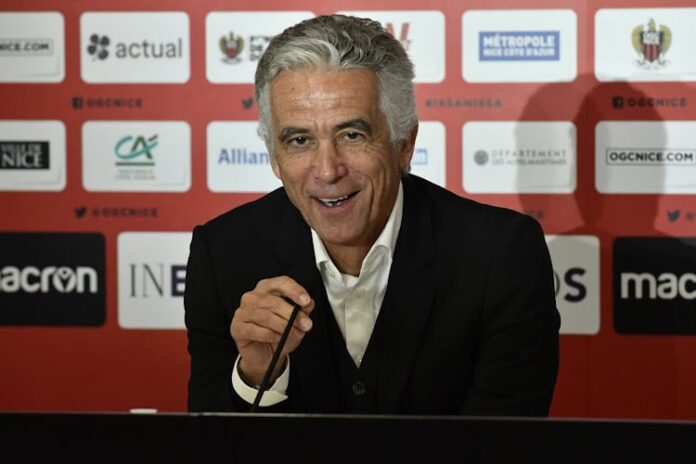The leader officially stepped down on August 20. Discreet yet influential, he leaves behind a stabilized club now led by Fabrice Bocquet, appointed Chairman and CEO.
On July 11, OGC Nice announced a departure that few observers had anticipated: Jean-Pierre Rivère was leaving the club’s presidency. The effective date, set for August 20, 2025, marked the end of a cycle that began in 2011. The Nice businessman, who arrived when the team was regularly struggling to stay in Ligue 1, leaves behind a transformed institution.
Upon his arrival, the Gym was experiencing a period of sporting and financial instability. Fourteen seasons later, the club regularly competes in European competitions and is now firmly established among France’s elite clubs. Jean-Pierre Rivère not only consolidated the professional team but also structured the entire organization, modernized infrastructures, and attracted strong investors, including the INEOS group in 2019.
The departure of Jean-Pierre Rivère does not signal a sudden break. The leader remains an ambassador for the club and takes on the presidency of the Endowment Fund of OGC Nice. In this way, he intends to continue contributing to the social and territorial development of the Gym. “I leave very confident about the club’s future,” he said in his farewell speech.
The Passing of the Baton
It is Fabrice Bocquet, general manager since November 2022, who takes over. His appointment is part of the continuity of the project desired by INEOS. Already heavily involved in operational management, he now becomes Chairman and CEO. Jean-Claude Blanc and owner Jim Ratcliffe entrust him with the responsibility of extending the work begun.
In recent years, Fabrice Bocquet has strengthened strategic functions and consolidated internal governance. His close working relationships with the sports management team, notably Florian Maurice and Franck Haise, should facilitate a smooth transition. “It’s an honor to succeed him. I will strive to live up to this mission, with commitment and humility,” he declared.
Jim Ratcliffe, owner of INEOS, praised Rivère’s role: “He led OGC Nice with passion, dedication, and vision. INEOS’s commitment to the club remains absolute, and we naturally and with full confidence chose to entrust Fabrice Bocquet with the mission of continuing the development.”
A Singular Presidency
The departure of Jean-Pierre Rivère highlights a leadership style that goes against the grain of modern football. In a world marked by charismatic or divisive figures, he chose discretion. Neither a former player nor a flamboyant magnate, he positioned himself as a measured leader. This stance has shaped his reputation as a mediator within the League. During tensions between club presidents, his opinion was often sought to calm debates.
This role was not solely due to his character. His professional trajectory illustrates a constant ability to anticipate and structure. Founder of ISelection, a pioneering company in the digitalization of new real estate, he sold the company to Nexity in 2008. He then continued with Rivère Group, specializing in high-end real estate on the Côte d’Azur. This experience provided him with financial stability and management methods he applied to football.
In recent statements, Jean-Pierre Rivère explained the timing of his departure. He wanted to avoid the decision being interpreted as a sporting consequence. OGC Nice will compete in this season’s Europa League instead with the goal of performing better than last season. “I leave because the club today is structured, solid, ambitious, and the path is set,” he stated.
Another factor weighed in: the 40th anniversary of the Populaire Sud, celebrated on August 23. “I could not see myself giving them a speech and then, fifteen days later, telling them I am leaving,” he admitted. This concern for transparency and sincerity with the supporters has always been a strong point of his mandate.
An Inheritance Difficult to Consolidate?
The legacy of the now ex-president goes beyond sporting results. He managed to anchor the club in a sustainable strategy. The training center was developed. The financial management is considered solid. Despite occasional crises—such as the incident during the match against Marseille in 2021, internal disputes in 2019—he maintained a line of stability.
This role as a stabilizer allowed him to establish himself as a figure of balance in an unstable environment. Without owning shares in the club’s capital, he retained significant influence. His ability to adapt to the arrival of INEOS and to coexist with new governance demonstrates rare flexibility in the field.
Today, the mission falls to Fabrice Bocquet to transform this stability into strengthened ambitions. The challenge is to confirm the European results while maintaining controlled financial trajectory. The appointment is part of an assumed continuity.
Jean-Pierre Rivère stepped down on August 20, but his impact remains. Fourteen seasons were enough to bring the Gym into another dimension. His leadership style, marked by discretion and consistency, now appears as a counter-model in an age of media-driven presidencies.
Fabrice Bocquet inherits a club of relative solidity, now endowed with a powerful but perhaps less engaged shareholder. Nonetheless, he can always count on a dedicated fan base ready to remind him of his rights and responsibilities if needed. The future will tell if this continuity translates into new successes. But the Jean-Pierre Rivère era ends on a note of stability, rare in a constantly evolving football world.


